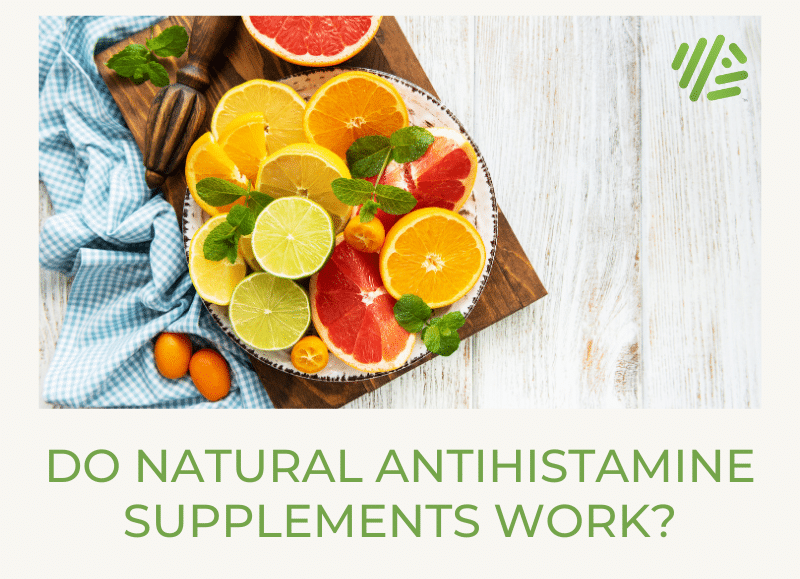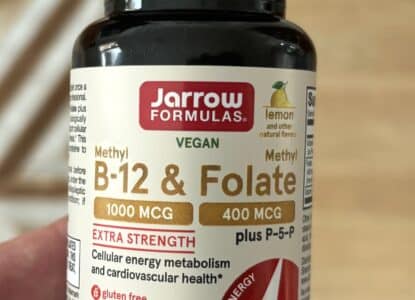Do Natural Antihistamine Supplements Work?

Contents
We have written previously on the blog extensively about histamine intolerance. Those posts became quite unruly at 5,000+ words, so to make things a bit more manageable for our readers, we decided to transplant the supplement content to its own devoted page.
Bifidobacterium strains of probiotic
We wrote about a special Bifidobacterium strain in our post about probiotics and brain health. Lots of probiotic blends contain a strain of B. Longum, but many don’t specify the strain. As we touched on in our brain health post, there is emerging evidence that B. Longum aids in breaking down histamine and ammonia, as well as increasing levels of butyrate, a short-chain fatty acid responsible for protecting the gut wall. 1
L. Plantarum LP299v strain
Like B. Longum, L. Plantarum has frequently been mentioned as one of the best strains of probiotic bacteria for combating histamine issues, and there are some limited in vitro studies that back up these claims. 2
The studies on L. plantarum and histamine degradation are not conclusive. There is some evidence the strain can be beneficial but it hasn’t been extensively studied.
Saccharomyces boulardii
Note: not everyone agrees on S. boulardii and histamine and please take note – S. boulardii is contraindicated for pregnant women because the safety is unknown.
Some mold doctors, like Dr. Neil Nathan, M.D., who we had on the podcast, believe histamine issues can be caused by mold toxicity. The good news is that we have lab tests available to either confirm or rule out these issues.
If you get the Great Plains or Real Time Labs testing done, and find that gliotoxins are elevated, Dr. Neil Nathan, in his book Mold and Mycotoxins, recommends S. boulardii as an effective binding agent to detoxify gliotoxin, which can be elevated due to mold, or some believe solely due to Candida overgrowth.
For a thorough rundown on S. boulardii, take a look at this blog post.
Diamine Oxidase
Diamine oxidase, or DAO, is the enzyme our bodies use to break down extracellular histamine, such as the histamine found in the gut.3
Vitamin C
Well, it doesn’t get much more boring than this, right? But people struggling with histamine often have a hard time with citrus fruits, so adding Vitamin C to the mix as a natural antihistamine could make sense.
As we document on our AOC1 gene page, Vitamin C is a diamine oxidase co-factor, so this makes sense.
Studies have also shown that Vitamin C helps to degrade histamine directly, but be careful, as I mention in a recent blog, not all Vitamin C is created equal. There are concerns about heavy metal toxicity in Vitamin C sourced from China
Vitamin B6
Another co-factor for producing diamine oxidase production, vitamin B6 in small doses has been helpful, although just like zinc, which I will mention next, be very careful with B6 dose. Taking too much can cause nerve damage, and I noticed that I felt a tingling in my feet when I took 50mg a few days in a row. 4
This is a supplement that requires conservative dosing.
Zinc
Concentrations of zinc actually prevent the release of histamine from mast cells, a key component of any natural antihistamine.5
When I came across this research, intuitively it made sense since zinc regulates immune system activity and histamine intolerance is tightly linked to the immune system. My experience supplementing with zinc has been that low doses are better. When I have experimented with large 50mg doses, I’ve found tremendous benefit in the short term, but notice that I need to rapidly back off and move to a maintenance zone or I will start to experience unpleasant side effects.
In my case, I believe a transition to a more plant based diet left me zinc-deficient, and a large preliminary dose helped me put my levels back to normal.
See also: Zinc has many health benefits but don’t overdo it
Quercetin
Note: Quercetin is another supplement that should be avoided during pregnancy.
As a mast cell stabilizer, quercetin is one of the usual suspects on the antihistamine supplement circuit, but it’s a powerful antioxidant that has shown efficacy in a number of contexts, so don’t pigeon hole this flavonoid. 6
In fact, our post on how apple consumption has been linked to decreased risk if cancer in a number of large epidemiological studies is largely about the health benefits of quercetin. Some team members here have cycled on and off with a 500mg quercetin and 150mg bromelain regimen in the mornings and have found that helpful.
L-theanine
As Aaron wrote about in his theanine post, theanine is another supplement that benefits the immune system and has been shown to inhibit the release of histamine from mast cells.7 8
An interesting note on berberine
Note: Berberine should be avoided during pregnancy.
We’ve written about berberine twice so far on the blog: once as an anti-cancer supplement and once on a men’s health post we did on prostatitis. So, you may be asking, why am I bringing it up in this histamine post?
Good question, and it’s because of a few snippets of this prostatitis rat study. One of the pathways the authors of the study on nonbacterial prostatitis found to be disrupted in afflicted rats was histidine metabolism. Authors further found that berberine effectively reset histidine metabolism, which helped alleviate prostatitis:
Our findings also show that berberine exhibited preventive efficacy against NBP by adjusting these multiple metabolic pathways to their normal states. Particularly, berberine can effectively regulate the metabolism pathways of histidine, nicotinate and nicotinamide, phenylalanine, arginine and proline, and tyrosine, and can exert a good therapeutic effect on NBP.
Now, for those of you who don’t know, histidine is an amino-acid precursor to histamine, meaning histidine is part of what makes histamine. This small rat study suggests that berberine may help the body better metabolize histidine, which could have beneficial effects for people with histamine intolerance. Presumably, one of the reasons people with histamine issues do well on a more plant based diet is their inability to deal with all the histidine in meat. Is it possible berberine resets a disrupted metabolic pathway?
Avoid Collagen and Bone Broth
Many of us who have had histamine issues have also suffered from periods with gut problems. Collagen and bone broth are marketed as “gut healing supplements.” But be forewarned, if histamine is the issue, collagen supplements are to be avoided. These products are rich in the amino acid histidine which converts to histamine in the body.
Key Takeaways
First, always talk to your doctor before starting with any new supplement.
Next, realize that what works for one may not work for another, so some degree of experimentation, especially with small doses may be the best way to find whether plant compounds can be an effective natural antihistamine for you and your family.



